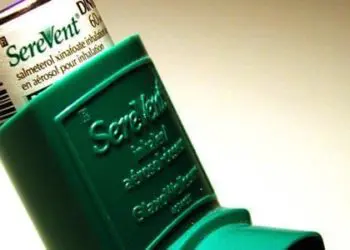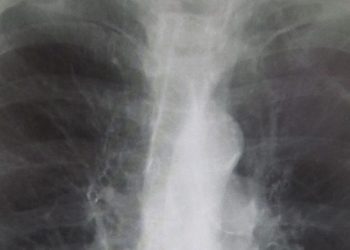Asthma remission common by late adolescence
Image: PD
1. Asthma remission was found to be common by late adolescence.
2. Sensitization to furred animals increases the likelihood of non-remitting asthma.
Evidence Rating Level: 2 (Good)
Study Rundown: The natural course of asthma has been studied with varying results. One of the key differences in studies is the benchmarks used to assess the incidence of remission. In addition, the influence of many variables on rates of remission remains to be studied. Through a questionnaire, clinical skin prick testing, follow up clinical assessment, interviews and surveys, this study examined the impact of sensitization to specific allergens, smoking, gender and heredity on the course of asthma from children diagnosed in early elementary to the age of nineteen. The authors found that asthma remission at age 19 was 21% for this cohort. Remission was significantly less common in girls, more severe cases of asthma, and in those that had sensitization to furred animal allergens. The study had excellent follow up for its cohort, but was limited by lack of data at baseline on measures of asthma severity and lack of dust mites in the geographical area studied. These findings suggest that clinical follow up of asthma may be able to be targeted by some risk factors for non-remitting asthma. It also suggests that research into interventions for sensitization to furred animal allergens may lead to better asthma outcomes.
Click to read the study, published today in Pediatrics
Relevant Reading: Follow-up of asthma from childhood to adulthood
In-Depth [prospective cohort]: This study assessed first and second grade school children in three municipalities in Sweden using the International Study of Asthma and Allergies in Childhood questionnaire beginning in 1996. Follow up included yearly questionnaires, skin prick testing, and pediatrician assessments. Of 3431 children participating (97% of surveyed population), 248 were followed subsequently as having asthma at baseline. Remission was defined as no use of medication and no wheeze for three years or more at the end of the survey. 21% of the children followed were in remission at age 19. Sensitization to furred animals decreased the odds of being in remission at the endpoint (odds ratio 0.14 95% CI 0.04-0.55). In addition, as prior studies have shown, having more severe asthma, or being female decreased the odds of being in remission at endpoint.
More from this author: Teens who text and drive take other driving risks TV associated with higher BMI in teens American Academy of Pediatrics updates its Medicaid Policy Statement Children with infected family/classmates more likely to contract warts
© 2013 2minutemedicine.com. All rights reserved. No works may be reproduced without expressed written consent from 2minutemedicine.com. Disclaimer: We present factual information directly from peer reviewed medical journals. No post should be construed as medical advice and is not intended as such by the authors, editors, staff or by 2minutemedicine.com. PLEASE SEE A HEALTHCARE PROVIDER IN YOUR AREA IF YOU SEEK MEDICAL ADVICE OF ANY SORT.






